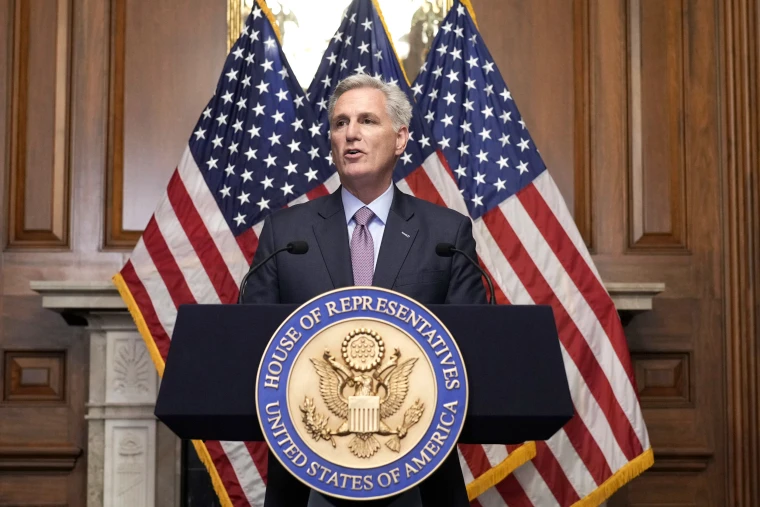In a historic defeat, Representative Kevin McCarthy has been ousted from his position as Speaker of the House of Representatives, drastically altering the political dynamic of Congress.
On October 3, Kevin McCarthy, a Republican representative from California, failed to receive the votes necessary to retain his power as Speaker, after far-right members of Congress challenged McCarthy’s leadership.
Challenges to McCarthy’s leadership were orchestrated by Rep. Matt Gaetz of Florida, who occupies the far-right faction of the Republican party and has become known as one of McCarthy’s primary political rivals in the House.
In a move not seen in more than a century, Gaetz opened a House vote on the “motion to vacate,” in the late afternoon of October 3; 216 members of Congress voted in favor of the motion and 210 voted against it. Among the slim majority who voted to oust McCarthy were eight Republicans.
McCarthy has often struggled to maintain support as Speaker since he was nominated and elected to the position by a majority of his House colleagues on January 7, 2023. It was only after four days of unsuccessful votes and 15 rounds of ballots that McCarthy gained the Speakership, which he won by a slim margin.
McCarthy was forced to negotiate with some members of his own party, including Gaetz, who did not initially support his intentions to become speaker. Among the concessions McCarthy made was a rule change that would allow Republicans to vote to oust him if they ceased to back him as Speaker, setting up the historic ouster that ended McCarthy’s short and contentious tenure as Speaker.
After the vote to dismiss McCarthy, Rep. Patrick McHenry, a Republican from North Carolina currently serving as theC hair of the Financial Services Committee, was named as the interim speaker until a permanent leader is chosen.
Soon after being ousted, McCarthy told reporters he does not intend to seek to regain his position.
“I will not run for speaker again,” McCarthy said. “I will have the conference pick someone else.”
While speaking to reporters McCarthy also criticized the political strategy Gaetz used to oust him, which he sees as unprofessional.
“You all know Matt Gaetz,” McCarthy told the room of reporters. “It was personal and had nothing to do with spending. Everything he accused somebody of, he was doing. That’s not governing, [and] that’s not becoming of a member of congress.”
When asked if he would resign from Congress, McCarthy said he hadn’t “thought about it,” but did not express concern over the possibility.
“If I lose my job over truly doing what I believe is right, I’m very at peace with it,” he said. “I knew they would make the motion on me.”
Dr. Pamela Maddock, History and Global Studies teacher at Williston, believes the fact that this situation is unprecedented means no one knows exactly what the implications of it could be.
“That’s why we keep hearing “historic” in the reports and that’s why strategists are saying we’re in uncharted territory,” Maddock told The Willistonian.
Maddock believes that Gaetz took advantage of McCarthy’s deal with Democrats to avert a shutdown in order to oust the speaker, a move she sees as opportunistic.
“The immediately pressing possible shutdown was averted over the weekend, [and] that was one reason—or perhaps excuse, depending on one’s perspective—that Congressman Matt Gaetz led the rebellion against Speaker McCarthy,” Maddock explained.
Since McCarthy’s ouster a number of Republicans have voiced interest in replacing him as speaker, with Rep. Jim Jordan of Ohio being the first to publicly say he plans on running. “We need to unite the conference,” Jordan said when asked about his plans to run.
Some have urged the House to act swiftly in working to elect a new Speaker, as it will be difficult for legislation to be passed without a formal leader.
“In terms of ability to govern, nothing can move forward in the House until they have a speaker, and at the moment it’s not clear who will get that job,” Maddock said. “Given the situation with the Republican Party it is clear why people would not want the role.”
Since McCarthy made concessions with far-right members of his party in order to win the speakership, some have raised concerns about the position becoming overly politicized.
For Maddock, recent conflict in the House is a consequence of divisions within parties.
“I’m not sure the leadership position is more or less politicized, but it’s a matter of divisions within the Republican Party right now,” Maddock said. “Matt Gaetz and others who said they will get rid of [their] own Speaker because he did the work of legislating and agreed to fund the government—that is what is different.”





















